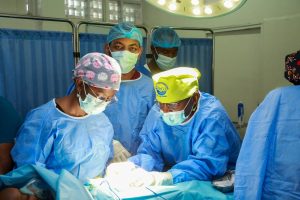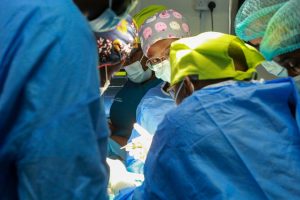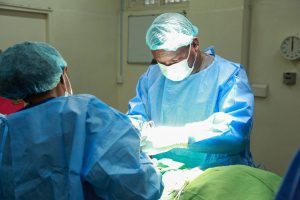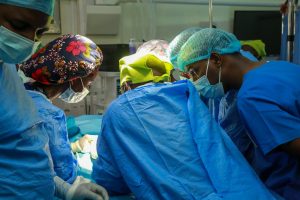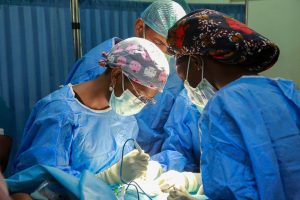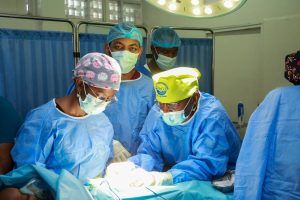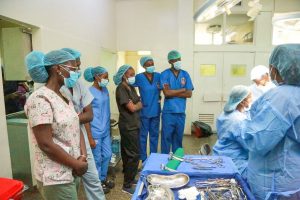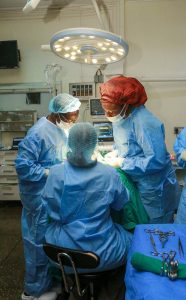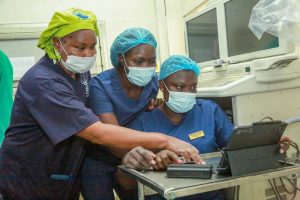Story by Sherine Atieno and photos by Ondari Ogega
Five-year-old Sheila Bahati has been living with omphalocele, a congenital (born with) condition where some of her abdominal organs developed outside the body.
During the ongoing annual paediatric surgical camp at Jaramogi Oginga Odinga Teaching and Referral Hospital (JOOTRH), she finally underwent a successful surgery to repair the defect.
For Bahati, the struggle has not only been medical but also emotional. As she grew older and joined school, she became painfully aware of how different she looked from her classmates. Her enlarged stomach often drew stares and whispers. Sometimes, she would ask her mother why her stomach was bigger than other children’s; the innocent questions that revealed her deep discomfort. The teasing and stigma occasionally made her mother lose appetite, worrying about her daughter’s health and happiness.
Her mother, Anne Obondo, has walked a long, painful, and hopeful journey with her daughter. Born at JOOTRH in December 2019, Bahati’s case was complicated from the very beginning. At six months of pregnancy, ultrasound scans left Anne devastated after she was told her baby “had no head and legs” and was advised to terminate the pregnancy. But she refused. Even when she was referred to Eldoret and told the same, her decision remained firm — to carry her child to term.
“I chose to protect my pregnancy,” she says softly, recalling the doubts and ridicule she endured. Many mocked her for ignoring medical advice. Some judged her, accusing her of neglecting pregnancy medication. Others whispered that she was wrong to keep the baby. But through it all, her spouse and family stood by her side, embracing both mother and child with love.
When Anne finally returned to JOOTRH, she feared rejection that the hospital might turn her away. Instead, she was admitted immediately and delivered through caesarean section. It was then that doctors explained her baby’s rare condition. “I had never come across or heard of such a condition before,” Anne recalls. Even after explanations, it remained difficult to understand what it meant for her daughter’s future.
For years, Bahati remained under close medical supervision. Doctors delayed surgery until her weight and blood count stabilized. During her clinic visits, Anne encountered other mothers with children battling similar congenital conditions. It was comforting to know she was not alone. Still, the journey was not easy. Financial struggles made travel to and from hospitals exhausting, but Anne pressed on, determined to find healing for her daughter.
When the JOOTRH paediatric surgical camp was announced, Anne was advised to donate blood in preparation for her daughter’s operation. She seized the opportunity. On the day of surgery, little Bahati was among 28 children taken to theatre and every one of them returned safely. Nurses continue to monitor her closely, and today, she is responding well to treatment.
Anne remembers how those innocent questions weighed heavily on her daughter, sometimes even making her lose her appetite out of sadness.
Now, with her surgery behind her, the mother sees a brighter future for her daughter. “It is just a matter of time and she will be better than before,” she says with renewed hope.
Anne’s advice to other parents is simple but powerful: “Do not neglect children born with deformities. Camps like this one bring solutions, especially to vulnerable families.”
This year’s camp, organized by the Kenya Association of Paediatric Surgeons (KAPS) in partnership with JOOTRH, is offering corrective surgeries to 124 children from across the lake region counties. All costs are fully covered by the Social Health Authority (SHA), lifting a heavy burden from families who would otherwise never afford such specialized care.
